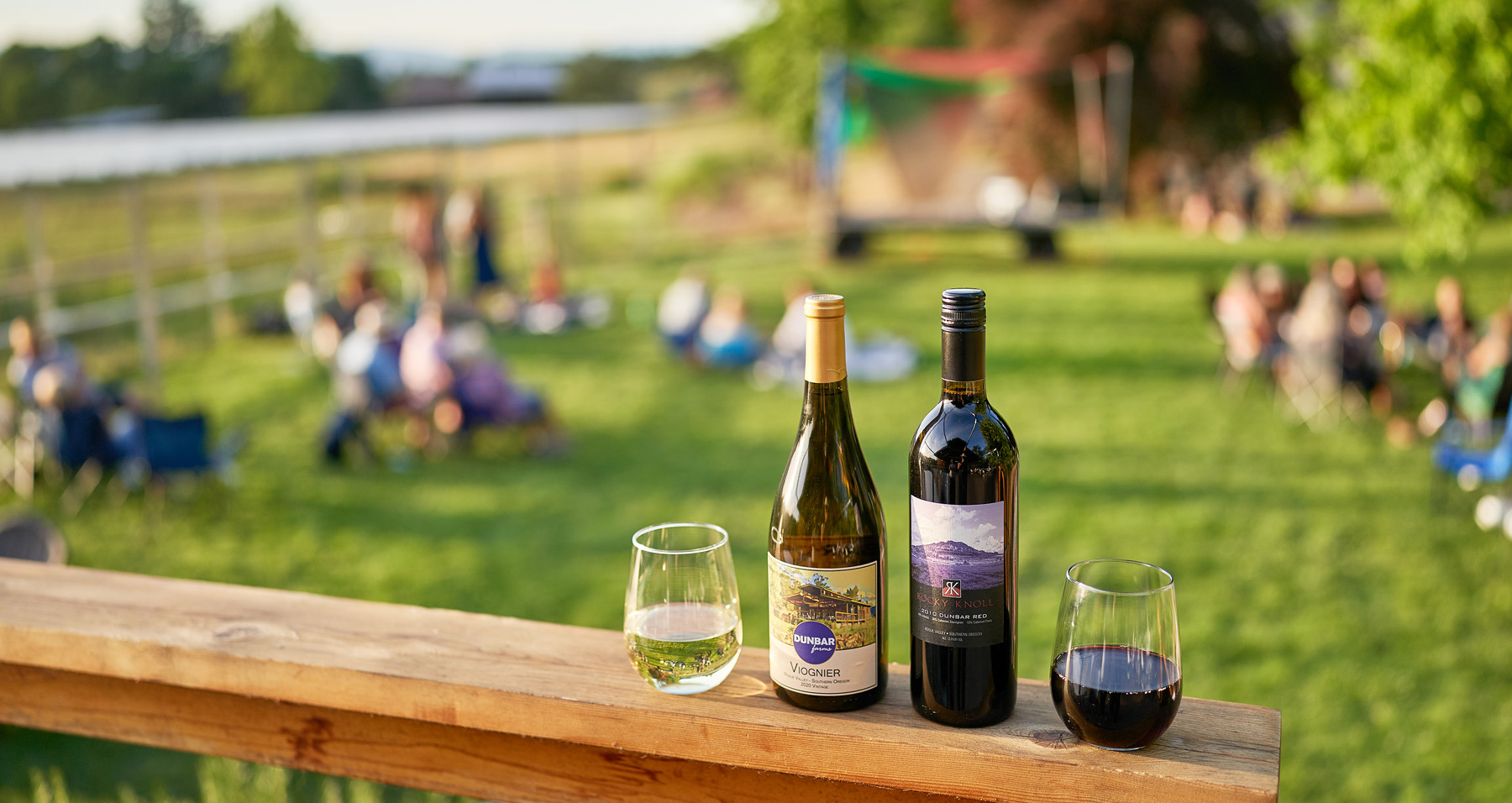Small Winemakers Cultivate the Land for Remarkable Wines
The Rogue Valley is home to many local boutique producers, each with their own character. They’re very much worth seeking out for individualized approaches to winemaking and intimate tastings and events. Plan your next wine tour around these small-but-mighty producers to experience the Rogue Valley’s distinctive landscapes in your glass – and sometimes just a few yards away from that glass.
Dwell Wines/Kenyon Vineyard
Kenyon Vineyard sits on the south bank of the Applegate River, just south of Grants Pass. Here, surrounded by mountains in every direction, grow the 15.3 acres of vines that produce Dwell Wines’ estate Pinot Gris, Pinot Noir, Chardonnay and Rosé releases.
While the vineyards don’t go all the way down to the riverside, the Applegate is a critical part of what makes the site special. Not only does it provide ample water for irrigation, it also affects the microclimate, which Linda Gee, who owns the vineyard along with her husband, Brent, suggests has a “potential cooling effect.”
Kenyon Vineyard spans a number of different soil types, including clay, sand and loam. Clay soils near the top of the hill tend to hold more water longer into the season and generate more vigorous canopies. Blocks nearer the river have fast-draining sand, which means drier soils. The middle blocks have a Goldilocks-like loamy soil that’s just right for producing Dwell Wines’ gold medal-winning single-vineyard Pinot Gris, which shows off flavors like tangerine, honeysuckle and pear.
Visitors are in luck. An intimate tasting room, repurposed from a building on the property, is being planned for an early summer opening. “It faces the vineyard so you can look at the vines and enjoy indoor or outdoor covered seating,” says Gee. She notes that guests will be able to enjoy their new releases at picnic tables under the apple trees that grace the lawn, as well.
 Dunbar Farms
Dunbar Farms
Rocky Knoll Wines/Dunbar Farms
Wine country without the drive? You bet. Dunbar Farms is actually located inside the city limits of Medford and just minutes from the airport. It hasn’t always been that way. When the family first started farming this 150-acre parcel in 1909, Medford wasn’t much of a metropolis — but over the decades, the town grew around the farm.
“People often describe us as Medford’s oasis,” says co-owner Nick Stevenson. But don’t expect an urban or industrial vibe. “From the tasting room, you’re looking at foothills on the other side of the valley, thanks to topography,” says Stevenson.
The first vines were planted on the “Rocky Knoll,” a hill at Dunbar Farms, in 1976 and 1977. Today the farm grows about 4 acres of Bordeaux varieties, including Cabernet Sauvignon, Cabernet Franc, Merlot and Malbec, along with grain, vegetables and livestock. Red wines are released under the Rocky Knoll label, while white wines made from purchased fruit are released under the Dunbar Farms label.
Low elevation and a south-facing aspect make it one of the warmest sites in the region, which means beautifully ripe grapes and wines with gravitas. When the tasting room opens again April 1, 2022, come by to sip a glass of Rocky Knoll 2008 Claret while enjoying a slice of margherita pizza or turkey pesto panini. Regular live music completes the experience.
Anchor Valley Wines
Curious wine lovers can take a virtual tour of the Rogue Valley without leaving the tasting room of Anchor Valley Wines in Jacksonville. Instead of growing its own grapes, this boutique producer purchases top-tier fruit from vineyards throughout the Rogue Valley AVA, each lot meticulously selected by winemaker Matt Cates. Since their start in 2016, Anchor Valley Wines has bought fruit from more than a half-dozen different farmers.
That eclectic approach means the production team is free to explore the unique microvariations created by variables like climate, elevation and aspect. Anchor Valley’s 2020 Chardonnay, for instance, is made with fruit grown at a small, high-elevation property on Slagle Creek Road in Applegate. Large diurnal shifts — the change in temperature between day and night — mean the fruit has time to hang longer on the vine and develop richer flavor.
“Chardonnay can be grown at so many different elevations, and where it’s grown really shows up in the wine,” says Amy Musselwhite, Anchor Valley Wines’ tasting-room manager. “Ours is really beautiful right now. It’s had time to develop those big, beautiful flavors, but our winemaker does it in a crisp, refreshing style.” Think of it as just one example of the beautiful dance between meticulous farming and winemaking that Rogue Valley producers do so well.


